Caregiver strategies: compassionate communication
Grandma’s birthday party
“That’s not my food.” Alexandra Castillo Weisgerber’s 99-year-old grandmother, who has dementia, was having fun at her birthday party – until dinner was served. Alexandra comes from a large, Cuban American family. They frequently get together with food and music to celebrate special occasions. Recently, Alexandra’s family gathered to celebrate their grandmother’s 99th birthday.
Her grandson lovingly sat Grandma down at the table. Grandma looked at the plate in front of her and said, “that’s not my food.” Her grandson repeatedly tried to convince her that her family had prepared that plate of food especially for her. Grandmother and grandson were each sure that they were right. Despite his good intentions, her grandson was unable to convince her to eat the food, which resulted in both of them becoming frustrated. Many caregivers have experienced similar situations and are unsure how to respond.
After seeing the interaction, Alexandra, an experienced Family Services Manager in our Greater Sacramento office, stepped in. She explains: “I picked up the plate. I said, “˜I’m going to go find your food. I don’t think this is your food.’ I walked out of the room, counted to five and brought the same plate back to her. I smiled, put it down and said “˜Here’s your food.’ Grandma thanked me and ate the meal.”
Nonverbal communication matters
As Alzheimer’s and other dementias progress, the individual’s verbal communication abilities decline. People living with dementia still respond to nonverbal communication. In fact as the disease progresses, the tone, body language and facial expressions of others will become the form of communication our loved ones may rely on most. If you are feeling frustrated, tired or anxious, your loved one may pick up on those emotions, but have difficulty interpreting them. Your emotions can impact their emotions. Try starting your interaction with a deep breath, smile and positive thought (e.g., “I’ve got this” or “I will be present”).
Communication tips from Alexandra
Alexandra shared some other tips that have been helpful to her and to the families with whom she works.
- Don’t argue or confront the person. While we can’t control the disease, we can try to control our response.
- Join their reality. What they are experiencing is real to them, due to the damage in their brain from the disease.
- Sometimes it helps to “reset.” Step outside for a moment or go to a different room. Close your eyes and take a couple of deep breaths.
- It may help to take the blame, even if it’s not your fault. Is it more helpful to be right or to be kind?
- Look for the underlying emotion in what is being communicated. Attend to the emotion. If your loved one keeps saying that s/he “wants to go home,” s/he may be feeling unsafe or insecure. Try reassuring the person and redirecting the conversation or activity.
- Be mindful of how you say things. Imagine what it might feel like to have a brain that isn’t working properly. It can be confusing, frustrating and scary. Then you hear one of these statements: “Don’t you remember my name?” “You can’t drive anymore.” “You just asked me that five minutes ago.” How would you feel? Focus on what your loved one can still do, not what s/he can’t do.
- Don’t exclude the individual with dementia from the conversation. Try to reduce other distractions in the environment (e.g., television noise, other conversations). Maintain eye contact. Give him/her extra time to respond. Take time to listen.
- Use touch, sights, sounds, smells and taste as forms of communication. Smile, hold hands, play their favorite music. It’s not all about words.
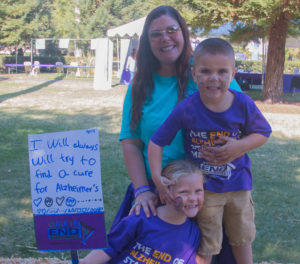
Alexandra, with her children
Be kind to yourself – nobody is perfect
No caregiver is perfect. We all make mistakes. In a moment of exhaustion or frustration, you may say something in a way that you later regret. Don’t dwell on it. Know that you’re doing the best that you can. Alexandra and other Helpline staff are available at 800.272.3900, 24 hours per day, 7 days a week, even on holidays. They can provide tips, share community resources or just listen.
Helpful information related to this blog post
Inside the brain: an interactive tour
Communication and Alzheimer’s
Online communication workshop
Upcoming education program listings
Support groups
Helpline or care consultations





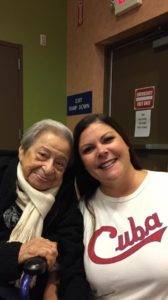
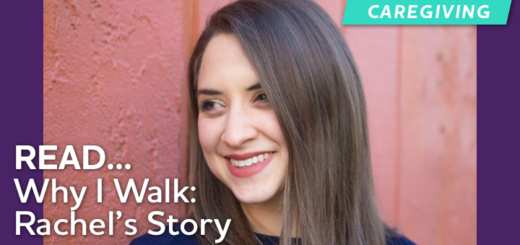
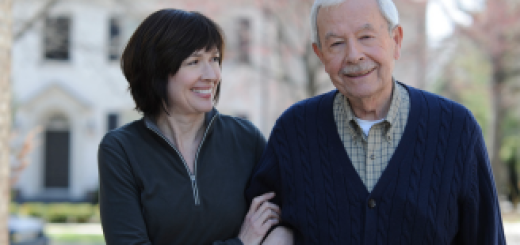
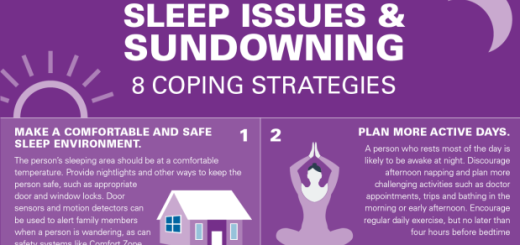










love your personal story Alexandra, thank you for sharing with us